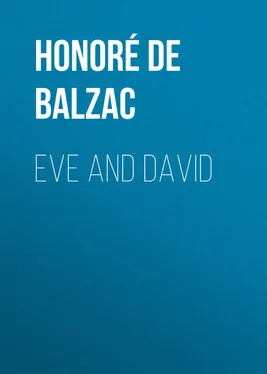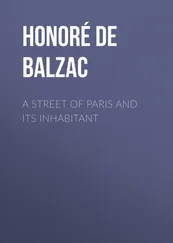Honoré Balzac - Eve and David
Здесь есть возможность читать онлайн «Honoré Balzac - Eve and David» — ознакомительный отрывок электронной книги совершенно бесплатно, а после прочтения отрывка купить полную версию. В некоторых случаях можно слушать аудио, скачать через торрент в формате fb2 и присутствует краткое содержание. Жанр: literature_19, foreign_antique, foreign_prose, на английском языке. Описание произведения, (предисловие) а так же отзывы посетителей доступны на портале библиотеки ЛибКат.
- Название:Eve and David
- Автор:
- Жанр:
- Год:неизвестен
- ISBN:нет данных
- Рейтинг книги:3 / 5. Голосов: 1
-
Избранное:Добавить в избранное
- Отзывы:
-
Ваша оценка:
- 60
- 1
- 2
- 3
- 4
- 5
Eve and David: краткое содержание, описание и аннотация
Предлагаем к чтению аннотацию, описание, краткое содержание или предисловие (зависит от того, что написал сам автор книги «Eve and David»). Если вы не нашли необходимую информацию о книге — напишите в комментариях, мы постараемся отыскать её.
Eve and David — читать онлайн ознакомительный отрывок
Ниже представлен текст книги, разбитый по страницам. Система сохранения места последней прочитанной страницы, позволяет с удобством читать онлайн бесплатно книгу «Eve and David», без необходимости каждый раз заново искать на чём Вы остановились. Поставьте закладку, и сможете в любой момент перейти на страницу, на которой закончили чтение.
Интервал:
Закладка:
By seven o’clock next morning, Boniface Cointet was taking a walk by the mill stream that turned the wheels in his big factory; the sound of the water covered his talk, for he was talking with a companion, a young man of nine-and-twenty, who had been appointed attorney to the Court of First Instance in Angouleme some six weeks ago. The young man’s name was Pierre Petit-Claud.
“You are a schoolfellow of David Sechard’s, are you not?” asked tall Cointet by way of greeting to the young attorney. Petit-Claud had lost no time in answering the wealthy manufacturer’s summons.
“Yes, sir,” said Petit-Claud, keeping step with tall Cointet.
“Have you renewed the acquaintance?”
“We have met once or twice at most since he came back. It could hardly have been otherwise. In Paris I was buried away in the office or at the courts on week-days, and on Sundays and holidays I was hard at work studying, for I had only myself to look to.” (Tall Cointet nodded approvingly.) “When we met again, David and I, he asked me what I had done with myself. I told him that after I had finished my time at Poitiers, I had risen to be Maitre Olivet’s head-clerk, and that some time or other I hoped to make a bid for his berth. I know a good deal more of Lucien Chardon (de Rubempre he calls himself now), he was Mme. de Bargeton’s lover, our great poet, David Sechard’s brother-in-law, in fact.”
“Then you can go and tell David of your appointment, and offer him your services,” said tall Cointet.
“One can’t do that,” said the young attorney.
“He has never had a lawsuit, and he has no attorney, so one can do that,” said Cointet, scanning the other narrowly from behind his colored spectacles.
A certain quantity of gall mingled with the blood in Pierre Petit-Claud’s veins; his father was a tailor in L’Houmeau, and his schoolfellows had looked down upon him. His complexion was of the muddy and unwholesome kind which tells a tale of bad health, late hours and penury, and almost always of a bad disposition. The best description of him may be given in two familiar expressions – he was sharp and snappish. His cracked voice suited his sour face, meagre look, and magpie eyes of no particular color. A magpie eye, according to Napoleon, is a sure sign of dishonesty. “Look at So-and-so,” he said to Las Cases at Saint Helena, alluding to a confidential servant whom he had been obliged to dismiss for malversation. “I do not know how I could have been deceived in him for so long; he has a magpie eye.” Tall Cointet, surveying the weedy little lawyer, noted his face pitted with smallpox, the thin hair, and the forehead, bald already, receding towards a bald cranium; saw, too, the confession of weakness in his attitude with the hand on the hip. “Here is my man,” said he to himself.
As a matter of fact, this Petit-Claud, who had drunk scorn like water, was eaten up with a strong desire to succeed in life; he had no money, but nevertheless he had the audacity to buy his employer’s connection for thirty thousand francs, reckoning upon a rich marriage to clear off the debt, and looking to his employer, after the usual custom, to find him a wife, for an attorney always has an interest in marrying his successor, because he is the sooner paid off. But if Petit-Claud counted upon his employer, he counted yet more upon himself. He had more than average ability, and that of a kind not often found in the provinces, and rancor was the mainspring of his power. A mighty hatred makes a mighty effort.
There is a great difference between a country attorney and an attorney in Paris; tall Cointet was too clever not to know this, and to turn the meaner passions that move a pettifogging lawyer to good account. An eminent attorney in Paris, and there are many who may be so qualified, is bound to possess to some extent the diplomate’s qualities; he had so much business to transact, business in which large interests are involved; questions of such wide interest are submitted to him that he does not look upon procedure as machinery for bringing money into his pocket, but as a weapon of attack and defence. A country attorney, on the other hand, cultivates the science of costs, broutille , as it is called in Paris, a host of small items that swell lawyers’ bills and require stamped paper. These weighty matters of the law completely fill the country attorney’s mind; he has a bill of costs always before his eyes, whereas his brother of Paris thinks of nothing but his fees. The fee is a honorarium paid by a client over and above the bill of costs, for the more or less skilful conduct of his case. One-half of the bill of costs goes to the Treasury, whereas the entire fee belongs to the attorney. Let us admit frankly that the fees received are seldom as large as the fees demanded and deserved by a clever lawyer. Wherefore, in Paris, attorneys, doctors, and barristers, like courtesans with a chance-come lover, take very considerable precautions against the gratitude of clients. The client before and after the lawsuit would furnish a subject worthy of Meissonier; there would be brisk bidding among attorneys for the possession of two such admirable bits of genre.
There is yet another difference between the Parisian and the country attorney. An attorney in Paris very seldom appears in court, though he is sometimes called upon to act as arbitrator ( refere ). Barristers, at the present day, swarm in the provinces; but in 1822 the country attorney very often united the functions of solicitor and counsel. As a result of this double life, the attorney acquired the peculiar intellectual defects of the barrister, and retained the heavy responsibilities of the attorney. He grew talkative and fluent, and lost his lucidity of judgment, the first necessity for the conduct of affairs. If a man of more than ordinary ability tries to do the work of two men, he is apt to find that the two men are mediocrities. The Paris attorney never spends himself in forensic eloquence; and as he seldom attempts to argue for and against, he has some hope of preserving his mental rectitude. It is true that he brings the balista of the law to work, and looks for the weapons in the armory of judicial contradictions, but he keeps his own convictions as to the case, while he does his best to gain the day. In a word, a man loses his head not so much by thinking as by uttering thoughts. The spoken word convinces the utterer; but a man can act against his own bad judgment without warping it, and contrive to win in a bad cause without maintaining that it is a good one, like the barrister. Perhaps for this very reason an old attorney is the more likely of the two to make a good judge.
A country attorney, as we have seen, has plenty of excuses for his mediocrity; he takes up the cause of petty passions, he undertakes pettifogging business, he lives by charging expenses, he strains the Code of procedure and pleads in court. In a word, his weak points are legion; and if by chance you come across a remarkable man practising as a country attorney, he is indeed above the average level.
“I thought, sir, that you sent for me on your own affairs,” said Petit-Claud, and a glance that put an edge on his words fell upon tall Cointet’s impenetrable blue spectacles.
“Let us have no beating about the bush,” returned Boniface Cointet. “Listen to me.”
After that beginning, big with mysterious import, Cointet set himself down upon a bench, and beckoned Petit-Claud to do likewise.
“When M. du Hautoy came to Angouleme in 1804, on his way to his consulship at Valence, he made the acquaintance of Mme. de Senonches, then Mlle. Zephirine, and had a daughter by her,” added Cointet for the attorney’s ear – “Yes,” he continued, as Petit-Claud gave a start; “yes, and Mlle. Zephirine’s marriage with M. de Senoches soon followed the birth of the child. The girl was brought up in my mother’s house; she is the Mlle. Francoise de la Haye in whom Mme. de Senoches takes an interest; she is her godmother in the usual style. Now, my mother farmed land belonging to old Mme. de Cardanet, Mlle. Zephirine’s grandmother; and as she knew the secret of the sole heiress of the Cardanets and the Senonches of the older branch, they made me trustee for the little sum which M. Francois du Hautoy meant for the girl’s fortune. I made my own fortune with those ten thousand francs, which amount to thirty thousand at the present day. Mme. de Senonches is sure to give the wedding clothes, and some plate and furniture to her goddaughter. Now, I can put you in the way of marrying the girl, my lad,” said Cointet, slapping Petit-Claud on the knee; “and when you marry Francoise de la Haye, you will have a large number of the aristocracy of Angouleme as your clients. This understanding between us (under the rose) will open up magnificent prospects for you. Your position will be as much as any one could want; in fact, they don’t ask better, I know.”
Читать дальшеИнтервал:
Закладка:
Похожие книги на «Eve and David»
Представляем Вашему вниманию похожие книги на «Eve and David» списком для выбора. Мы отобрали схожую по названию и смыслу литературу в надежде предоставить читателям больше вариантов отыскать новые, интересные, ещё непрочитанные произведения.
Обсуждение, отзывы о книге «Eve and David» и просто собственные мнения читателей. Оставьте ваши комментарии, напишите, что Вы думаете о произведении, его смысле или главных героях. Укажите что конкретно понравилось, а что нет, и почему Вы так считаете.












